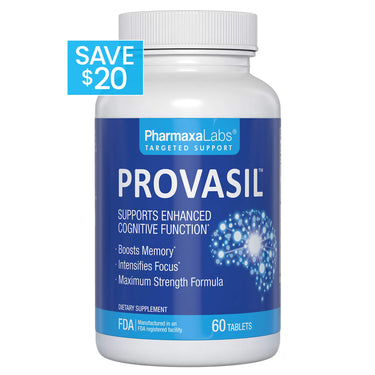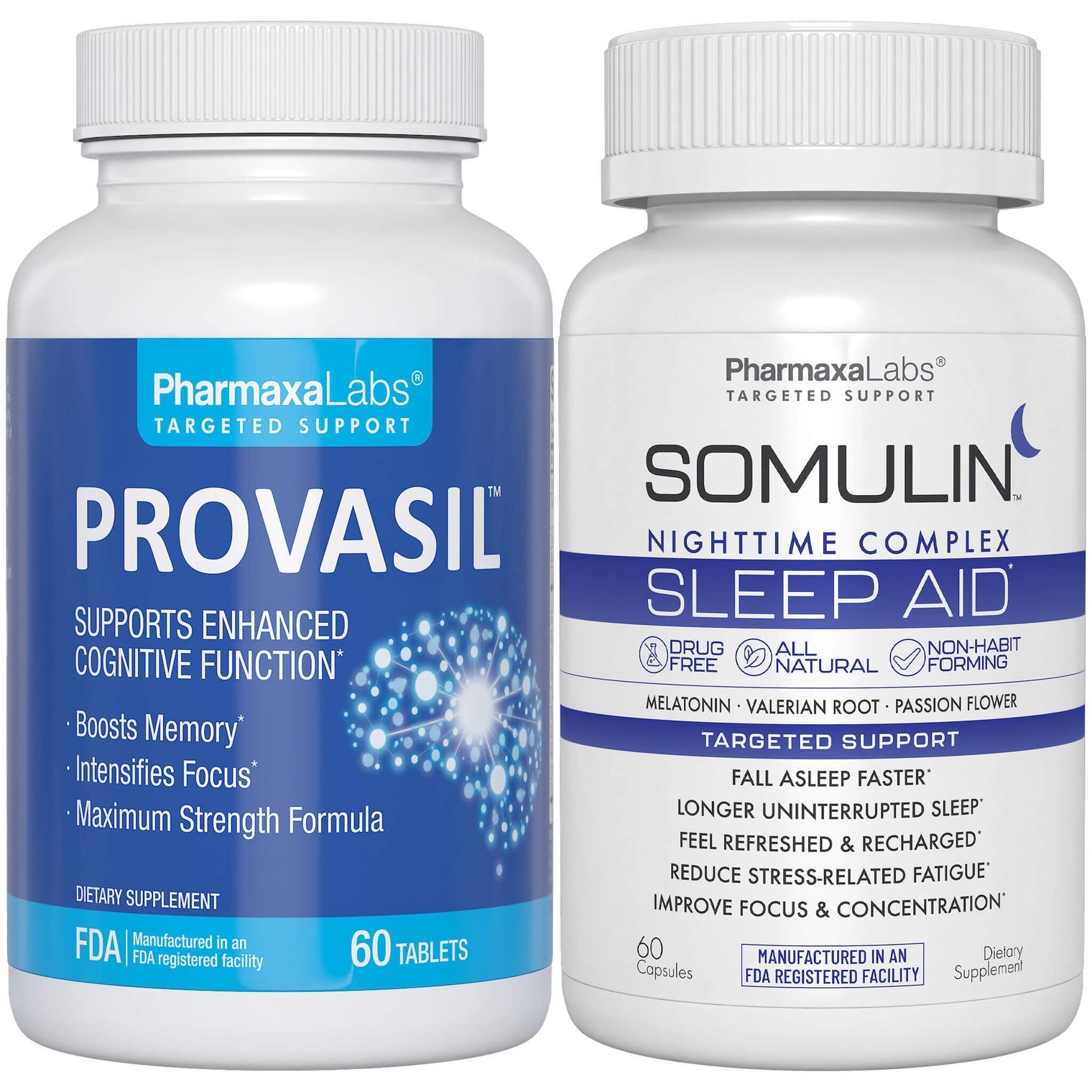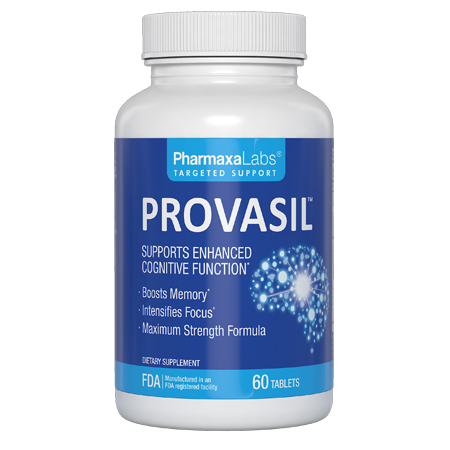Cognitive Health & Sleep Support
Enhanced Cognitive Function & Deep, Refreshing Rest
Description
Benefits
Cognitive Health & Sleep Support Includes:
-

Provasil
Natural Cognitive Support
Provasil offers powerful, all-natural support for cognitive health, promoting optimal daily brain performance while providing long-term protection for cognitive function.
-

Somulin
Nighttime Complex
Somulin is an all-natural sleep aid that reduces anxiety, stress and uneasiness, promoting quicker sleep onset and healthier, more consistent sleep patterns over time.
Full list of Ingredients
Ingredients in Provasil
Ginkgo Leaf
Ginkgo leaf contains flavonoids that may benefit brain health and eye function. Research suggests it could enhance cognitive abilities in individuals with dementia, potentially improving mental performance and attention.
Bacopa Monnieri
This antioxidant-rich herb is associated with potential cognitive benefits, including possible effects on memory and learning. A 12-week study indicated that regular bacopa supplementation might enhance certain aspects of cognitive processing.
Biotin (Vitamin B7)
Biotin plays a role in nerve function and may contribute to cognitive health. It interacts with other B vitamins and could influence mood and concentration. Some research has explored its potential neuroprotective properties.
Phosphatidylcholine
This compound is important for brain development and function. It may help support memory by influencing acetylcholine levels, with one study noting cognitive effects shortly after administration.
Panax Ginseng Root
Panax ginseng is thought to support brain health, mental energy, and cognitive function. A 12-week study observed potential improvements in individuals with cognitive decline who took ginseng.
Resveratrol
This plant-derived compound has antioxidant properties that may support multiple aspects of health. One study involving postmenopausal women suggested it might help maintain cognitive function, particularly in areas like verbal memory.
Vitamin C
Known for its antioxidant and immunity-supporting properties, Vitamin C may play a role in brain health throughout life. It could help protect against oxidative stress in the brain and, by doing so, potentially reduce the rate of cognitive decline.
Choline Bitartrate
Choline is crucial for brain cell membranes and neurotransmitter production, potentially supporting better focus and memory. Research has suggested that low choline levels might be associated with an increased risk of cognitive decline.
N-Acetyl-L-Carnitine
This compound has protective antioxidant properties and may influence acetylcholine levels in the brain, potentially enhancing recall ability and memory formation. Some research has investigated its suggested neuroprotective effects.
Phosphatidylserine
Important for brain cell membranes, phosphatidylserine may support various cognitive functions including memory and concentration, and assist in regulating neurotransmitter levels. Some studies have explored its potential role in supporting brain health.
L-Glutamine
This amino acid supports cognitive function for potentially enhanced alertness and memory. By assisting in removing ammonia from the brain, it may also play a role in protecting against certain neurodegenerative conditions.
Docosahexaenoic Acid (DHA)
An omega-3 fatty acid, DHA is important for brain cell structure and cell communication. It is thought that low levels may contribute to a decline in cognitive function and research has explored its role in brain development and cognitive ability.
Folic Acid
Adequate folate levels are important for cognitive health and may reduce hippocampal damage. A study of adults aged 50-70 found that folic acid supplementation was associated with improvements in certain cognitive areas including information processing.
L-Tyrosine
This amino acid may support cognitive functions, in particular those related to alertness and working memory. Some studies have explored its potential positive effects on mood and feelings of anxiousness.
Vitamin B12
Essential for supporting brain health, adequate B12 levels are important for helping to maintain cognitive function. Research has found associations between B12 levels and cognitive performance in older adults.
Ingredients in Somulin
Valerian Root
Valerian root promotes relaxation, and according to a research review improves sleep quality. It also supports GABA levels, a neurotransmitter that decreases anxiety, for an improved sleep experience.
German Chamomile
Chamomile serves as a natural sedative, promoting tranquility. Research has shown its effectiveness in enhancing sleep patterns in postpartum women and the elderly.
5-HTP (From Griffonia Sinensis Leaf)
5-HTP, from the Griffonia simplicifolia plant, promotes sleep, relaxation and overall well-being by increasing serotonin production. Research has highlighted the potential benefits of 5-HTP in improving sleep disorders.
Melatonin
This natural hormone promotes sleep and regulates sleep-wake cycles. One comprehensive research review showed that it effectively reduces sleep latency while improving sleep quality and duration.
Lavender
Lavender promotes calmness, enhances relaxation and improves sleep quality by increasing levels of the brain chemical GABA, thereby reducing stress. One study confirmed its anxiety-reducing properties.
Lemon Balm
Lemon Balm, particularly when combined with valerian root, enhances calmness and improves sleep quality.
Hops
Hops possess natural sedative effects that promote faster sleep onset, deeper relaxation and reduce restlessness. One study confirmed its sleep-enhancing properties, particularly when used in conjunction with valerian root.
Skullcap
Skullcap enhances sleep quality, with one study revealing its mood-elevating and anxiety-reducing effects which contribute to relaxation and quicker sleep onset.
Passion Flower
Passionflower increases GABA levels in the brain, reducing stress and the time it takes to fall asleep. One study demonstrated anxiety reduction and improved sleep quality within just 7 days of usage.
-
100% Money-Back Guarantee
-
One Time Purchase - No Subscription
-
Free Shipping On $60+ Orders




